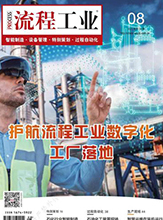BLOCKCHAIN AND BEYOND
Industry 4. 0 , Industrial Internet or Internet of Things (IoT) —no matter which buzzword you are using,the digital transformation process our industries are currently undergoing is tremendous. The full potential of digitalization is nowhere near exhausted.

Same as other industries the processindustry has a long way to go to fully deploy the potential of IoT: Artificial Intelligence and (big) data analyticsare on hype right now and seem to be the answer to almost every question in business development (to be honest:mostly it’s far more complex); cloud computing is building the backbone of moder ngloba lized companie s ;virtual reality and augmented reality is increasingly used to enhance B2C as well as B2B services. The important
5G technology is just showing up to accelerate even more the exchange
of data,including those generated in worldwide industrial sites.
While all companies a re cur rently looking for possibilities to integrate IoT approaches and further digitalize their processes, starting flagship projects and evaluating use cases, other big things are already showing upTaking a g l impse into supply chain management,which is still not as efficient as it could be, feeling the desire for trust and security within global partner networks and listening to the demand for integrated and standardized data models makes me f inally look at distributed ledger technology(DLT), for the most people better known as blockchain. Actually,blockchain is only one type of DLT.
Experts often talk about standardized data models along the value and supply chain. So why not make use of DLT,which allows great interoperability of data and increasing transparency while having an
eye on data security? Security and trustworthiness will always be on the agenda of integrated supply chain networks, especially in asset-
and IPdriven industries such as the process industry.
DLT could create trust between (unknown) players along the complete supply chain as well as address several challenges of supply chain management: just think about record keeping or tracking and tracing of products. Another example,where you need to manage reliable information to e.g. address reporting needs would be REACH.
Of course, DLT is still under development,but it looks to be better automized and more secure than current databases can be as well as more reliable and overall less costly.DLT could increase efficiency along
the supply chain and decrease the risk of losing products while eliminating middlemen and intermediaries along the supply chain. So,it looks like the technology is either an enemy or savior.How do you think about it?











跟帖
查看更多跟帖 已显示全部跟帖